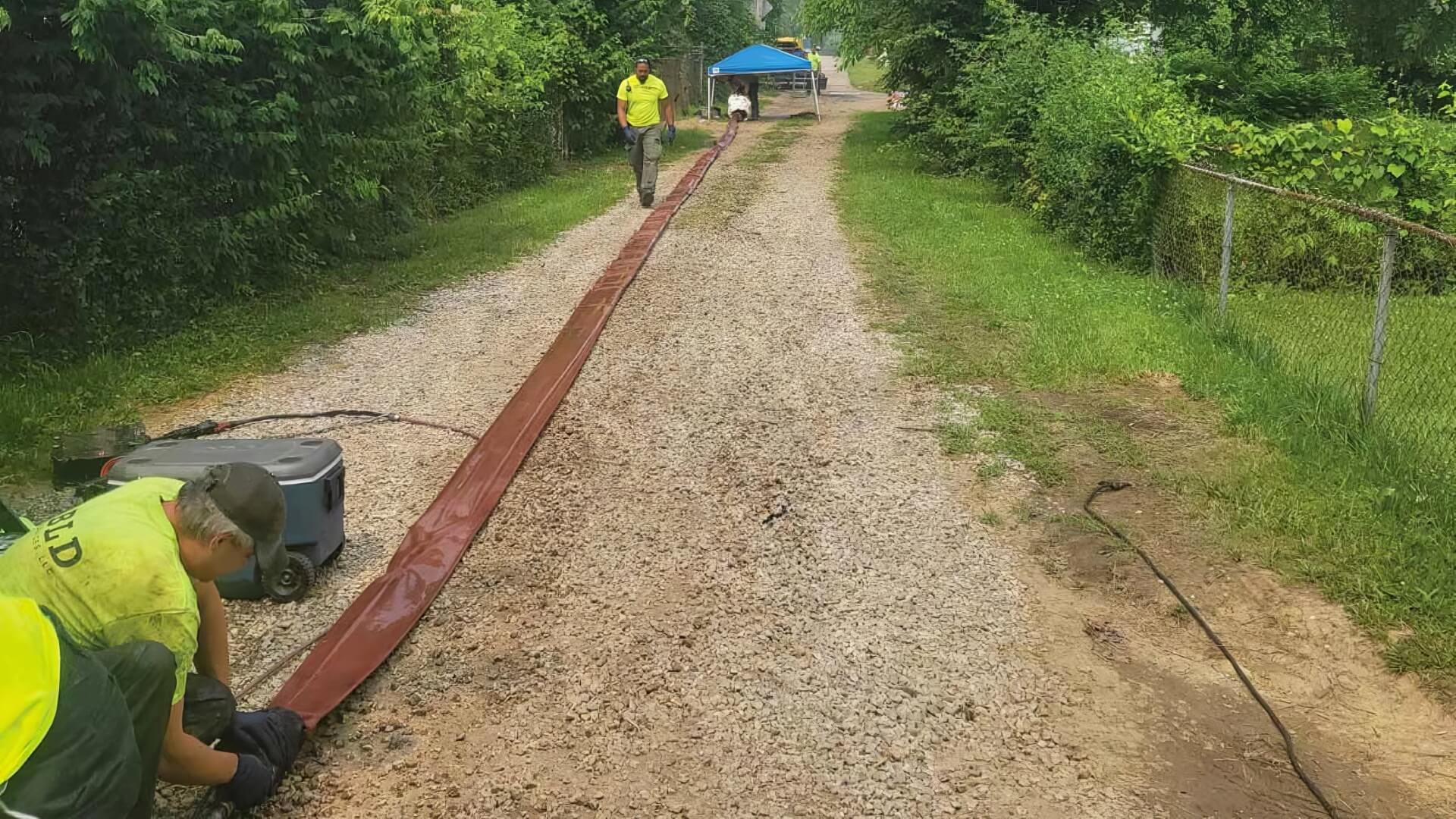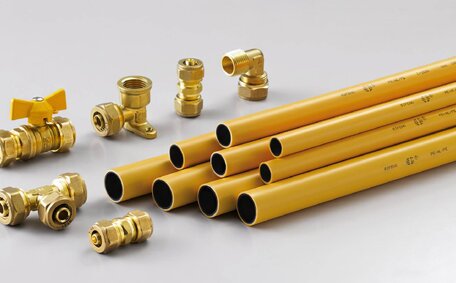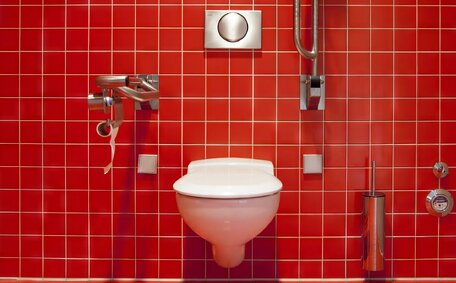Introduction to Drain Blockages
Bathroom blockages frequently disrupt households and businesses, leading to backups and potential flooding if not quickly addressed. The purpose of this discussion is to enlighten readers on how do unblock drains effectively, as well as pinpointing the precise moment when professional assistance is necessary.
Blocked drains, often caused by build up, halt the seamless flow of waste water, compelling homeowners to learn how unblock drain pathways or call a professional to remedy the situation swiftly. Accumulations of hair, grease, food particles, and soap scum are common causes of blocked drains.
A homemade mixture of baking soda and vinegar is a sustainable way to break down obstructions and help water flow. However, aggressive drain cleaners may inhibit water flow and damage pipes, and thus should be avoided.
For severe cases such as sewer backups, it’s essential to call in experienced plumbing professionals. Equipped with high-pressure jetters and cctv cameras, they can properly diagnose and address the problem.
Common Causes of Drain Blockages
Common sources of drain blockages include:
- Hair - Strands of hair can ensnare in pipes, accumulating in shower drains and gradually creating clogs.
- Food waste - Scraps and oil washing down your kitchen sink may cling to the pipe interiors, creating residue inside your drain system.
- Tree roots - Root systems from trees and shrubs can grow into exterior drainage pipes.
- Foreign objects - Trinkets, or items as seemingly harmless as baby wipes, when flushed, may make their way into plumbing and become a lodged nuisance.
- Diapers - Disposable diapers commonly cause your toilet to clog when flushed.
Blockages can occur as debris gathers in pipe curves and joints or areas with reduced water flow. The more confined conduits within your property are similarly prone to circumstances where drains can become obstructed. Embracing preventive practices like the use of drain screens and scheduled maintenance can make sure your drain remains free-flowing more reliably.
Signs You Have a Blocked Drain
Blocked drains manifest through unmistakable signs like:
- Water draining at a snail’s pace from your shower drain, sinks, or bathtubs
- Gurgling noises originating from your sinks and drains
- Unpleasant sewage odours around drains
- Low water pressure throughout your plumbing system
Partial clogs slow water flow and lead to backups; notably, water takes longer to drain from sinks and tubs.
As the blockage intensifies, you’ll need to be alert for gurgling noises emerging from the drain, indicating air and water struggling past the clog.
The strongest odours typically emanate from floor drains, and toilets may back up and overflow due to pressure buildup from downstream blocks.
Acting swiftly to remedy blocked drains is crucial to prevent exacerbation, as waste continues to accumulate and cause blockages. A professional plumber utilises methods like augering or high-pressure water jetting to properly clear blockages, ensuring unobstructed drains.
Trying Home Remedies
Boiling Water
Boiling water is effective at dissolving and dislodging grease blockages. Pour 1-2 kettles of boiling water down the drain, wait a few minutes, then flush with cold water. Repeat if needed. This is safe for most pipes but avoid pouring directly on plastic pipes.
Baking Soda and Vinegar
Try using a reaction between baking soda and vinegar to break down soap scum and hair, without causing damage to your pipes over time. Seal the drain for a duration of 5-10 minutes as the reaction effervesces, which can cause damage to your pipes if done improperly, then proceed to cleanse with nearly boiling water. Pour a cup of baking soda directly down the drain, followed by a cup of hot water mixed with a cup of white vinegar.
Plunger
If the drain clogged situation persists, hot water can be poured for another try. Utilise a drain cover to avoid splashes.
Fill the sink with sufficient water to cascade over drain and entirely veil the aperture. Submerge the plunger and vigorously plunge up and down 10-15 times to dislodge the clog.
Flush your drains with hot water after using home remedies to remove any remaining blockage material. These methods work best for partial obstructions. Deep blockages or ones that reoccur will need a professional plumber with high-pressure jetting tools.
Boiling water is effective at dissolving and dislodging grease blockages.
Repeat if needed.
When to Call a Professional Plumber
While home remedies for unclogging drains are numerous, discerning when to seek expert plumbing services for persistent or severe clogs is crucial.
Contact your local plumber right away if you experience any of the following with your blocked drain:
- Water backing up or overflowing from multiple drains
- Flooding in your home from a drain backup
- Sewage odours throughout the house
- A blockage in your main sewer lines
- Reoccurring drain clogs that home remedies cannot clear
Undertaking an attempt to fix a blocked drain in the main line by yourself, utilising drain snakes or chemical concoctions, might harm your pipes and precipitate perilous leaks. Professional grade hydro jetting tools are often needed to fully clear out tougher obstructions.
Plumbers have the expertise to correctly diagnose drainage issues and identify the cause and location of the blockage using drain cameras. They can check for issues like collapsed pipes, root intrusion or grease buildup.
By calling Coogee Plumbing on 1300 349 338 or emailing [email protected] as soon as you notice a persistent clogged drain, We can come to your aid swiftly, addressing clogs before they can lead to water damage or unhealthy sewage backflow into your home.
Our very professional team is accessible any time day or night to address a drain being blocked across the Coogee area. We utilise the latest methods and equipment to clear blocked drains thoroughly in a prompt, efficient manner. Feel free to get in touch any time you require a meticulous plumbing service specialising in drain unblocking.
Methods Plumbers Use to Unblock Drains
Professional plumbers use specialised tools such as drain snakes and advanced techniques to clear blockages beyond the reach of DIY methods. Common equipment plumbers use includes:
Drain Snakes
Professional plumbers may use a drain auger, also called a drain snake, which is a long, flexible cable used to hook and dislodge debris. They are fed down pipes to break up blockages and ensure clogs come out like hair, grease, and other materials. Distinctive hooks and add-ons of various sizes can help prevent clogs and are chosen depending on the drain and clog type.
Hydrojetters
Hydrojetters deploy potent water currents to cleanse pipe linings, ensuring your drain clear of any stubborn residues. They are mounted on trucks and can generate up to 5000 PSI for cutting through tough blockages. Hydrojetting is purposefully utilised to clear blocked drain lines, particularly in sewer systems.
Hand Rodding Tools
Hand rods with attachments like blades and plumbers’ snakes allow manual augering for sink, tub, and other small drainlines. They enable forceful extraction of debris.
In severe cases, pipes may need to be disassembled or excavated to remove very stubborn obstructions. Plumbers will assess the most effective and least invasive method based on the drain and blockage. Their skills ensure thorough resolution of blockages, completely clearing drains with minimal risk to the piping.
How Long Does It Take a Plumber to Unblock a Drain?
On average, a professional plumber can unblock a standard blocked kitchen or bathroom drain within 1-2 hours. However, the actual time required depends on several factors:
- Location of the blockage - Clearing blockages further down the main sewer line takes more time.
- Severity of clog - Partial obstructions are quicker than completely blocked pipes.
- Drain type and access - Kitchen sinks are typically easier than tub/shower drains.
- Tools and methods - Simple hand rods can be faster than hauling hydrojetting equipment.
For simple sink or tub clogs, an experienced plumber can often get the drain freely flowing again within the hour using hands-on mechanical methods like augering cables, plungers or hand rods.
If hydrojetting is required for deeper main line blockages, the process of setup, jetting, and post cleaning may take 2-3 hours. Complicated blockages requiring excavation and pipe repairs could take most of the day.
To get rid of blocked pipes swiftly, engaging a professional as soon as issues emerge is advisable. DIY drain remedies often take much longer and may fail to fully unblock the pipe. Our team at Coogee Plumbing uses state-of-the-art techniques to clear drains thoroughly and efficiently.
Location of the blockage - Clearing blockages further down the main sewer line takes more time.Cost to Unblock a Drain Professionally
Engaging a professional plumber to unblock a drain incurs costs, with homeowners often wondering how much does cost, ranging from $150 - $350 depending on factors such as the nature of the clog.
Understanding how much it does cost, for simple sink or tub drain clogs, you can expect to pay around $150 - $250 to find out how much does it cost. This covers 1-2 hours of the plumber’s labour to snake or rod the drain and get it freely flowing again.
For main sewer line blocks or more extensive drain clogs, costs are usually between $200 - $350, and sometimes it may be necessary to call a professional. Hydrojetting or excavating damaged pipes takes more time, effort and equipment. Complex jobs needing camera inspections or multiple access points will be at the higher end.
Other factors that can increase drain unblocking costs include:
- Emergency after hours or weekend callout fees
- Drainline length and difficulty accessing the clog
- Whether outdoor excavation is necessary
- Amount of debris buildup needing removal
- Follow-up drain treatments or repairs recommended
At Coogee Plumbing, we provide upfront quotes and ensure there are no hidden charges. Our focus is on fast, effective drain unblocking to get your plumbing cleaned up and fully operational again. Contact us on 1300 349 338 for reliable, affordable services in Sydney’s eastern suburbs.
Preventing Future Drain Blockages
There are several effective ways to help prevent drain clogs from recurring in the future:
- Employ drain strainers - One of the most common and effective ways includes installing filters in sink drains to intercept food scraps, hair, and similar refuse.
- Avoid grease buildup - Let grease cool and solidify before being disposed of in the trash, rather than poured into drain lanes.
- Limit food waste - Compost vegetable peels, eggshells and other scraps instead of using the garbage disposal.
- Flush responsibly — ensure only human waste and toilet paper go down the toilet, avoiding materials that risk causing blockage. Never flush wipes or other unflushables.
- Clean with care - Use a mild detergent and limit use of thick conditioners and soaps that leave residue.
- Inspect outside drain areas - Clear foliage and assorted waste from stormwater drains to avert blockages.
Consistently keeping your drainage system clear with mesh filters, enzyme detergents or bicarb soda flushes can assist in halting blockages before they commence. Contact a plumber for professional drain cleaning services as needed.
Conclusion
In summary, blocked drains are a common nuisance that can be caused by a buildup of hair, grease, food waste and other debris. Quick action is important to avoid backups and flooding. There are several home remedies like boiling water, plungers and baking soda mixes that may clear minor clogs.
For stubborn or severe blockages that risk home damage, it’s best to call a professional plumber with advanced tools. They have specialised hydrojetting tools and drain snakes to thoroughly clear out obstructions. Attempting to DIY clear deep main line clogs risks damage and leaks.
Signs blocked like slow draining, gurgling noises, sewage odours and water pooling indicate a clog. Plumbers can quickly diagnose the issue and get drains freely flowing again in 1-2 hours typically. Costs range from $150 for simple drain clearing to $350 for extensive hydrojetting.
Preventative measures such as using drain strainers, avoiding grease buildup, and limiting food waste disposal are key. Overall, acting quickly at the first sign of a clog and hiring a professional like Coogee Plumbing provides the fastest, safest resolution for smooth-running drain lines.
For dependable drain unblocking services, you’re welcome to call us at Coogee Plumbing on 1300 349 338 or reach out via email to [email protected]. Our skilled team is always ready to remedy drain clogs and restore optimal plumbing function.






